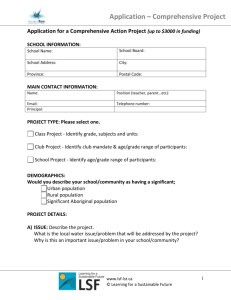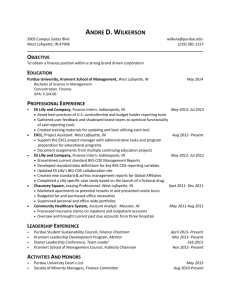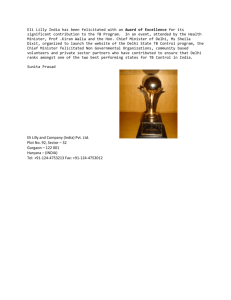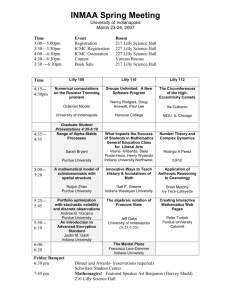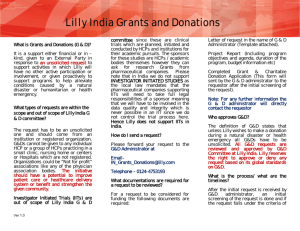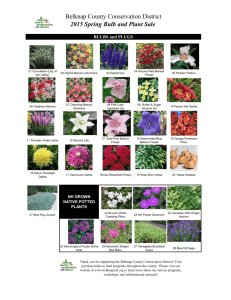Summary of Projects - Deafed.net Homepage
advertisement
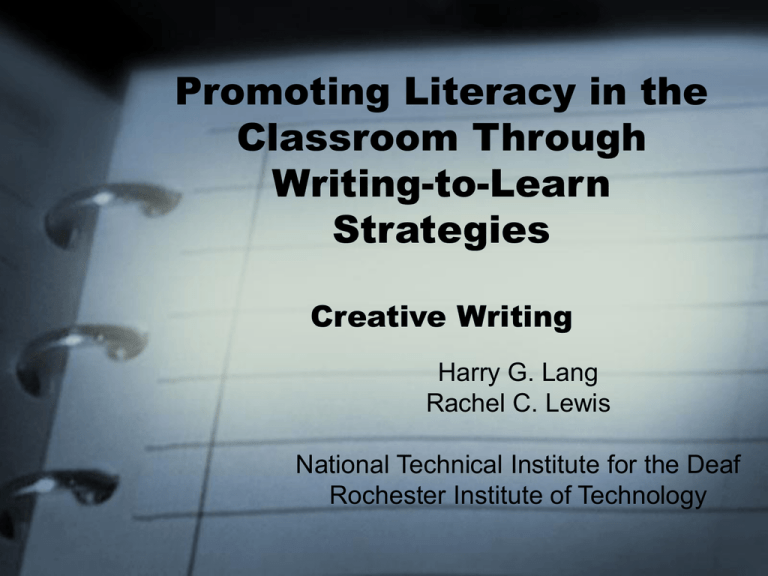
Promoting Literacy in the Classroom Through Writing-to-Learn Strategies Creative Writing Harry G. Lang Rachel C. Lewis National Technical Institute for the Deaf Rochester Institute of Technology Active Learning The creative piece is one of many “writing-to-learn” activities that can be used to examine how deaf students are constructing knowledge as they learn science and mathematics. Active Learning In this PowerPoint slide show we will demonstrate this strategy with examples as well as samples of student writing. But, first, we want you to try the approach yourself. Activity • In film clip C1, a few drops of water are placed in an empty aluminum can and the can is heated. When steam is seen escaping from the can, the can is quickly placed in some cold water. What happens? See Film clip C1 Activity • Imagine that you are taking a science class and you are studying air pressure. When the temperature increases inside the can, air escapes and the pressure in the can decreases. Activity • When the can is placed in cold water, the pressure around the outside of the can is much greater than the pressure inside the can. An implosion! The Creative Piece After viewing film clip C1, please write a short essay of 5-10 sentences. Instructions a teacher would give to students: • Please write a short essay of 5-10 sentences. Title it “I am an Air Molecule in the Pop Can” • Include a description of the science concepts you have been learning (energy, temperature, pressure, heat, etc.) The Creative Piece Writing to Learn Science - A Naturalistic Study* Samples from Classrooms Around the Country *Lang, H.G., & Albertini, J.A. (2001). Construction of meaning in the authentic science writing of deaf students. Journal of Deaf Studies and Deaf Education, 6, 258-284. The Creative Piece "I am an air molecule in the pop can." One fine day I was in the Coke can, hanging around with the billions of friends, when things got heated up. We started to move around faster and faster, till the water molecules joined us from down below. Suddenly, everything slowed down, after a lot of friends had left. The only thing was - the door was closed, so my friends outside tried to get in other ways. Instead, the can crumbled under their pressure. The Creative Piece Other teachers in the Lang & Albertini (2001) study tried the creative piece during various science activities: Students were asked to imagine themselves as • Bacteria • Chemical elements • Simple machines • Soap bubbles • Falling bodies • A cookie passing through the digestive system The Creative Piece • Film clip C2 shows a mathematics teacher who is teaching “polygons.” At the end of the class, she asks each student to imagine that he or she is a particular polygon. They are to attend a “Polygon Party” and introduce themselves to each other and describe their characteristics. • See Film clip C2. The Creative Piece Variations of the creative piece used by other teachers: • Students drafted a one-act play with the characters being two plants discussing their genetic differences • In math classes, they imagined themselves as – Fractions – Slopes Math Class Example Why Is It Interesting to be a Fraction? “I think it’s interesting to be a fraction because I have a bottom number and a top number. The people call my bottom number the denominator, and for my top number, the numerator… What I can do is make myself smaller, and bigger. For example I give the people a four for the numerator and a eight for the denominator, the people who work on me would take my four and turn me into a one. And for my denominator number is eight, the people turn me into a number 2 for a new denominator. I don’t know why the people do that to me, but I hear the people’s teacher told the class, students, that it’s called simplifying, which means to reduce me to the lowest term. To me it’s an odd name, but then again I have a lot of names, people called me after I change. Oh yea!” Science Example: Igneous Rock • Some students were asked to write a creative story from the point of view of an igneous rock. They were mainly to write about their formation. Science Example: Igneous Rock “Beauty Pink” I live in Italy. then my name is beauty pink. the heat and hot thing keeps pressure me I don’t like it! then the volcano eupt I poped out! I flew all over to other country and land in California of Hollywood. then I was so hot so I land in a water finally I’m so cool not hot anymore! Whew! then I was flowing in a beach some cute guy found me he picked me up and brought me to a new home it was his place a guy Who named a [boy’s name]. I was dull but later on for days [boy’s name] took be to a rock store. asked the man to make me look beautiful now I look beautiful I’m color of pink, white, dark pink mixed together! So now I’m a beautiful crstayal now I’m so happy that [boy’s name] found me and kept me forever! -8th grade deaf girl Earth Science • A preservice teacher candidate also experimented with writing to learn in her first student teaching. Here is one sample she shared from Earth Science: “Core to Crust” • When I in core and it very hot and I want to come out and so I have dig out and I arrive at mantle and I became lava and I go flat through rock and it really hard go to through rock and I melt fast and I was so liquid lava and I go up fast through rock then I arrive crust and I push land and land become bump then I come out like volcano. Now I am cool. Earth Science Reflections as a Teacher Candidate It was fascinating to see the evolution of the students’ confidence to write because the first piece they did was this project and they were not sure what to do. The more we did writing to learn activities, the more confident they became and that was the ultimate goal of mine for the students. I thank you for teaching me this method. :) Another Example: Recycling “My Life as Paper” The first was seeds, the plant grows. The next day it grow so huge. The men cut me to put me in the tree cut machine to make a calendar. When the people finished with May calendar, and they tear me. The people must use me! It helped them to memorize the date. I was so proud that I helped people lots. People liked me because I was an calendar. The calendar were all in the whole world. The Creative Piece How to Work with Students Who Are Beginning Writers • Begin with pictures, diagrams, illustrations; then label the parts of the pictures. Finally, encourage the students to write short sentences connecting the parts. • Concept maps may also be very helpful. There are excellent websites to help teachers learn more about the use of concept maps and other graphical organizers, which may aid both writing and the construction of knowledge. Chemistry Example: “Atom Party” written by “Neon” • I’m just went to party. My protons and electrons are 10. My shell is K=2 L=8. It’s satisfy. I’m repel oxygen, fluorine, lithium, sulfur, and gold. That’s why I mostly repel with them. I’m alone atoms! The Atom Party Teacher Reflection: “Calcium initially said she had 2 electrons for grabs and found oxygen or sulfur for “an equal fit.” Fluorine summarized that he needed one more electron in his last shell and could fit with lithium, but not with neon or calcium (although he really could fit with calcium). Oxygen is a creative student and describes how he sees elements fighting for electrons during the party but manages to introduce himself to lithium and get one electron. On the way out chlorine tried to steal it but he beat him up to keep the electron. While there are some small errors in their writings, the goal of the activity was for students to have practice with the idea that number and placement of electrons determines chemical reactivity and tendencies for behavior.” Social Studies: Cultural Differences One Act Play: “Difference Between Us” Lilly: How as the village life in Israel? Aliliah: Most villages have farm and people are very poor. Villagers often believe in the old ways and work hard to perserve their traditions. It’s same as your home areas? [look like puzzled] Social Studies: Cultural Differences One Act Play: “Difference Between Us” Lilly: Wow! Yeah, we only have few place that do that. What about city life? Aliliah: Villagers who were expected to get high pay job moves to city. Social Studies: Cultural Differences One Act Play: “Difference Between Us” Lilly: Pardon me for my rudeness. My name is Lilly, what’s yours? Aliliah: That’s alright. It’s Aliliah Lilly: Whew! Nomadic life is difficult? Aliliah: Well, depends. But nomads is very rare, because people finally decided to stay in one place. Same as yours? Social Studies: Cultural Differences One Act Play: “Difference Between Us” Lilly: Well, I doubt. Wow, Middle East’s life is very interesting! Aliliah: Hey. Why aren’t you dressing like muslims or something else? Social Studies: Cultural Differences One Act Play: “Difference Between Us” Lilly: Oh, (laughing). I’m not from around here. I live in America, the state is Pennsylvania. Aliliah: You’re American! It’s my first time to meet a pure American. Lilly: Yeah. It’s my first trip to the Middle East. I always want to touch this land and finally my dream came true! Social Studies: Cultural Differences One Act Play: “Difference Between Us” Aliliah: That’s wonderful. How old are you? Lilly: 16, you? Aliliah: Same! Wow, what a small world. Lilly: You can speak English. How come? Social Studies: Cultural Differences One Act Play: “Difference Between Us” Aliliah: My parents went to live in America while they are having me. They want me to be Israel citizen. Lilly: Cool! I got to go. See ya tomorrow! It’s late! Aliliah: [puzzled] Hey, it’s still day break! Lilly: I know. In America, it’s nightbreak! Good night! The Creative Piece: Social Studies Teacher Reflection on her lesson about cultural differences: • “I realized that they understand traditions, culture and life in a Muslim country. However, they totally missed the point that Israel is NOT an Islamic state. That really surprised me since we had discussed it in depth.” Science Example: The Digestive System Teacher’s Objectives 1. Understand the sequence of organs and their functions in the digestive system 2. Summarize hands-on lesson about the digestive system Activity: Students made 3-dimensional paper organs of the entire digestive system to fit into a life-size skeleton. Science Example: The Digestive System “I Am Lost In Kevin’s Body” My friends and I am a chocolate chip cookies. My friends and I are sitting on a plate for people to come and eat us. Later on there was a young boy named Kevin. He took one of the cookies, which was me. I was scared to death! “I Am Lost In Kevin’s Body” Kevin put me into his mouth. His mouth looked sharp and had many over lapping teeth. Then suddenly he bit me. Half of my body was bitten off. After that my body was all broken up in many small pieces and I was squeezed into his very thin esophaung which was very dark. “I Am Lost In Kevin’s Body” I saw something white below. After a while all of me was slipped into his stomach which had a bunch of other foods and drinks. I was stuck in his stomach until I was alls squeezed into his small intestine I was all mushed up like a baby food. “I Am Lost In Kevin’s Body” When I was in the small intenstine the blood cells were cleaning me like “Seprating the parts.” After that I went out the anus into the toilet and flushed down to the pipe. The End. The Creative Piece • “Students generally showed understanding of the digestive system and the functions of various parts of the body involved in digesting a cookie. The trip through the body was generally accurate, although the description of the functions often lacked depth.” • This teacher planned a matching game to follow the creative writing in order to further evaluate comprehension of the functions. The Creative Piece Teacher Reflection: “I must admit this set [of Writing to Learn activities] was my favorite and I really got excited by some of the work! The students enjoyed this type of writing more so than the others. . . everyone wanted to share their writings after they finished. In these creative writings, the student also wrote more. They had more to share and did not realize they were putting so much down.” Summary • The creative piece as a writing-tolearn strategy is not only an approach to assess students’ construction of knowledge, but also an opportunity for them to show creativity • Teachers can see when students are developing misconceptions Summary • Teachers can assess many topics over a period of time – Example: In mathematics, slope, decimal, graph, number line, algebra… • Teachers felt it beneficial in seeing various levels of writing abilities Summary • Teachers also believed that the writing activities helped students develop self-efficacy, the belief that “I can learn to write well”
